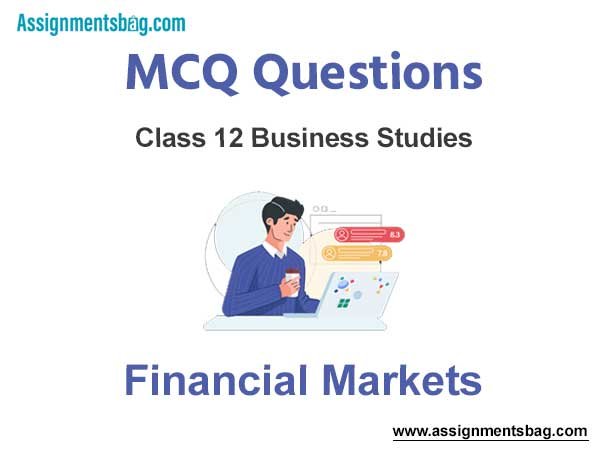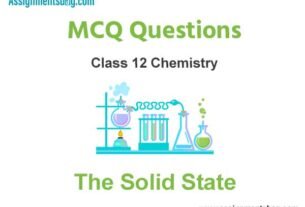Please refer to MCQ Questions Chapter 10 Financial Markets Class 12 Business Studies with answers provided below. These multiple-choice questions have been developed based on the latest NCERT book for class 12 Business Studies issued for the current academic year. We have provided MCQ Questions for Class 12 Business Studies for all chapters on our website. Students should learn the objective based questions for Chapter 10 Financial Markets in Class 12 Business Studies provided below to get more marks in exams.
Chapter 10 Financial Markets MCQ Questions
Please refer to the following Chapter 10 Financial Markets MCQ Questions Class 12 Business Studies with solutions for all important topics in the chapter.
Question.Training of intermediaries of securities market relates to which function of SEBI?
(a) Regulatory
(b) Development
(c) Protective
(d) Controlling
Answer
B
Question. Which money market instrument is also known as Zero Coupon Bonds ?
(a) Treasury Bill
(b) Call money
(c) Certificate of Deposit
(d) Commercial Bill
Answer
A
Question. ______________is not a participant in many market.
(a) Mutual funds
(b) RBI
(c) NBFCs
(d) SEBI
Answer
D
Question. Treasury bill is issued by
(a) development financial institution
(b) commercial bank
(c) selected individuals
(d) reserve bank of India
Answer
D
Question. Which instrument of money market is issued by RBI on behalf of the Central Government?
(a) Treasury Bill
(b) Call money
(c) Certificate of Deposit
(d) Commercial Bill
Answer
A
Question. Certificate of deposit is issued by
(a) mutual fund companies
(b) Reserve Bank of India
(c) Large Corporate House
(d) Commercial bank and development financial Institution
Answer
D
Question. The new issues market is also known as-
(a) Money market
(b) Pomary market
(c) Stock exchange
(d) Secondary market
Answer
A
Question. Call money is used to
(a) maintain a minimum cash balance known as a cash reserve ratio
(b) To meet floatation cost
(c) To meet working capital needs
(d) To meet fixed capital needs
Answer
A
Question. Which instrument does not relate to money market
(a) Call Money
(b) Treasury bill
(c) Commercial Bill
(d) IPOs
Answer
D
Question. commercial paper is for period of
(a) 91 days to 365 days
(b) 1 day to 15 days
(c) 15 days to 45 days
(d) 15 days to 1 year
Answer
D
Question. Two major classifications of financial markets are
(a) Money market and capital market
(b) Primary market and secondary market
(c) Debt market and Equity market
(d) Whole sales market and retail market
Answer
B
Question. Instruments deals in capital market are
(a) call money
(b) Commercial Bill
(c) Zero Coupon Bard
(d) Equity Shares
Answer
D
Question. Money market deals with instruments having maturity period of
(a) Less than one year
(b) More than one year
(c) Less than three years
(d) More than Three years
Answer
A
Question. Maturity period to call money is-
(a) 1 to 15 days
(b) 15 to 90 days
(c) 15 to 1 years
(d) 1 to 30 days
Answer
A
Question. Which money market instrument is used for interbank transaction?
(a) Treasury Bill
(b) Call money
(c) Certificate of Deposit
(d) Commercial Bill
Answer
B
Question.Dematerialization is the process of holding securities in
(a) Paper mode
(b) Electronic mode
(b) Physical form
(d) Volet
Answer
B
Question. Only buying of securities takes place in
(a) Secondary market
(b) Primary market
(c) money market
(d) capital market
Answer
B
Question. Secondary market is also known as
(a) Primary Market
(b) New Issue Market
(c) Financial Market
(d) Stock Exchange
Answer
D
Question. Instruments with a maturity period of le than one year are traded in-
(a) Money market
(b) NSEI
(c) Stock exchange
(d) Capital market
Answer
A
Question. An ideal Capital market is one-
(a) Where finance is available at higher cost.
(b) Must provide insufficient information to investors.
(c) Where market operations are inconsistent.
(d) Which facilitatis e-conomic growth.
Answer
D
Question. An money market instruments issued on behalf of Central Government.
(a) Call Money
(b) Treasury Bill
(c) Commercial Paper
(d) Commercial Bill
Answer
B
Question.To trade in securities what is necessary?
(a) Fixed Assets
(b) Demat Account
(c) Current Account
(d) Knowledge of stock market
Answer
B
Question. Primary and secondary market
(a) Compete with each other
(b) Complement with each other
(c) Function independently
(d) Control each other.
Answer
B
Question. Liquidity states of certificate of deposit which is more negotiable is considered as-
(a) Certified liquidity
(b) team liquidity
(c) More liquid
(d) lees liquid
Answer
C
Question. Money market is a market for dealing in
(a) Long term fund
(b) Medium term fund
(c) short term fund
(d) Both a and b
Answer
C
Question. If a company is already in liquidity crunch and flotation costs of the issue would be high. What kind of instrument will be appoints for the money market.
(a) Commercial Bills
(b) Commercial paper
(c) Treasury Bill
(d) COD
Answer
B
Question.Demat account is opened with
(a) Depository participant
(b) SEBI
(c) RBI
(d) NABARD
Answer
A
Question. Full form of e-IPOs-
(a) Electronic internet Public Offer
(b) Electronic Initial Private Offer
(c) Electronic Initial Prospectus Offer
(d) Electronic Initial Public Offer
Answer
D
Question.Which one is Regulatory function of SEBI?
(a) Training of intermediaries of Security market
(b) Registration of Broker and Sub- Broker
(c) Undertaking steps for investors protection
(d) Promotion of fair trade practices.
Answer
C
Question. Dinesh has 100 equity shares of a company. He wants to sell 500 of these shares. Which market should be approach?
(a) Secondary market
(b) Primary market
(c) Financial market
(d) Money market
Answer
A
Question. Which money market instrument is used to maintain CRR by the banks?
(a) Treasury Bill
(b) Call money
(c) Certificate of Deposit
(d) Commercial Bill
Answer
B
Question. Which one is the Development function of SEBI?
(a) Training of intermediaries of Security market
(b) Registration of Broker and Sub- Broker
(c) Undertaking steps for investors protection
(d) Promotion of fair trade practices.
Answer
A
Fill In The Blanks :
Question. An institution which provides a platform for buying and selling of existing securities is known as ________
Answer
Stock exchange
Question. It has been made compulsory to settle all trades with in ________ days of the trade date.
Answer
2
Question. BSE was established in the year ________ .
Answer
1875
Question. The function of SEBI which leads to ________ and________ growth.
Answer
capital formation ,economic
Question. The two main depository participants in India are ________ and CDSL.
Answer
NSDL
Question. Maturity period of commercial papers is ________ to ________ .
Answer
15 days, 1 year
Question. Prohibition of fraudulent and unfair practices is________ function of SEBI.
Answer
protective
Question. Meeting flotation cost, ________ is used as one instrument of money market.
Answer
commercial paper
Question. NSE in India started operation in the year ________ .
Answer
1994
Question. Two major alternative mechanism through which allocation of funds can be done are ________ and financial markets.
Answer
bank
Question. Treasury bills are issued by Reserve Bank of India on behalf of the ________ .
Answer
Government of India
Question. National stock Exchange in India was Incorporated in the year ________.
Answer
1992
Question. The forces of demand and supply help to establish a ________ for the commodity as service in the financial market.
Answer
price
True / False :
Question. Controlling unfair trade practices is a Regulatory function of SEBI.
Answer
False
Question. The participants in the capital market are foreign investors, RBI and Bank.
Answer
False
Question. Stock Exchange helps in dealing of second hand securities.
Answer
True
Question. Treasury Bills are available in 25,000 and its multiples.
Answer
True
Question. Secondary market directly promotes capital formation.
Answer
False
Question. The instruments sold in the capital market are treasury bill, certificate of deposits, call money etc.
Answer
False
Question. Secondary market helps existing investors to invest and fresh investors to enter the market.
Answer
True
Question. Sensex is the bench mark index of the NSE.
Answer
False
Question. Registration of cpllecting investing schemes and Mutual funds is a Regulatory function of SEBI.
Answer
True
Question. Commercial bills are common instrument used in credit purchase and sale.
Answer
True
Question. Debentures can not be traded in stock exchange.
Answer
False
Question. A prospectus is a direct appeal to investors to raise capital through an advertisement in newspapers, magazines etc.
Answer
True
Question. The capital market is generally much safer with a minimum risk of default.
Answer
False
Match the following :
Question. Match the following on the basis of money market
| (i) Instruments issued by Reserve Bank of India on behalf of Central Government | (a) Call money |
| (ii)It is issued to meet cash reserve ratio with the reserve bank of India | (b) Commercial papers |
| (iii) It is issued at the time of tight liquidity when deposits are less and demand of loan is high | (c) Certificate of Deposits |
| (iv) Companies use this instrument for the purpose of bridge financing | (d) Treasury Bills |
Answer
(i)-(d),(ii)-(a),(iii)-(c),(iv)-(b)
Question. Match the following on the basis of Financial market
| (i) Market where short term securities are sold | (a) Financial Market |
| (ii)Market for creation and exchange of financial assets | (b)Primary Market |
| (iii) It sells equity shares, debentures, bonds and preference shares | (c)Money Market |
| (iv) In this market flow of funds is from savers to investors of the company | (d) Capital Market |
Answer
(i)-(c),(ii)-(a),(iii)-(d),(iv)-(b)
Question. Match the following on the basis of floatation in primary market
| (i) Securities are not sold directly to general public | (a) E-IPOs |
| (ii) Securities are sold directly to public through online | (b) Private placement |
| (iii) Securities in primary market are sold to selected individuals | (c) Offer right issue |
| (iv) Securities are sold to existing shareholders | (d) Offer for sale |
Answer
(i)-(d),(ii)-(a),(iii)-(b),(iv)-(c)
Question. Match the following on the basis of duration ofmoney market instruments
| (i) Commercial Papers | (a) 1 day to 15 days |
| (ii) Call money | (b) 15 days to 365 days |
| (c) 1 year to 5 years |
Answer
(i)-(b),(ii)-(a)
Question. Match the following instruments of money market
| (i) Instrument which used to meet the minimum requirement of CRR | (a) Commercial bills. |
| (ii) Instrument which are issued by RBI on behalf of the government of India. | (b) Commercial paper. |
| (iii) It is an unsecured promissory note issued by public or private sector companies. | (c) Treasury Bills |
| (iv) These are common instrument used in credit purchase and sale. | (d) Call Money |
Answer
(i)-(d),(ii)-(c),(iii)-(b),(iv)-(a)
Question. Match the following different financial market
| (i) It is a market for short term fund. | (a) Secondary Market. |
| (ii) It is a market for medium and long term fund. | (b) Primary Market |
| (iii) It is a market for new securities | (c) Capital Market |
| (iv) It is a market for resale and purchase of securities. | (d) Money Market |
Answer
(i)-(d),(ii)-(c),(iii)-(b),(iv)-(a)

We hope you liked the above provided MCQ Questions Chapter 10 Financial Markets Class 12 Business Studies with solutions. If you have any questions please ask us in the comments box below.


